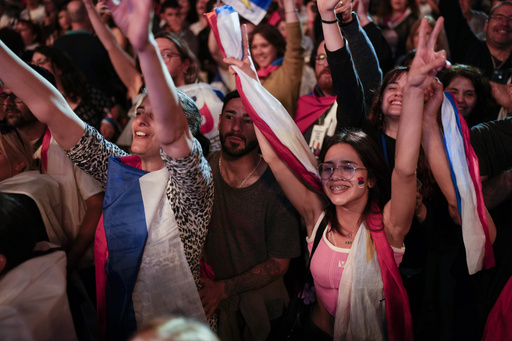
MONTEVIDEO, Uruguay — The presidential election in Uruguay commenced on Monday, marking the start of a month of intense campaigning as the leading center-left and center-right coalitions aim to attract more voters ahead of a crucial runoff scheduled for November 24.
The competition is anticipated to be competitive, yet there is a general consensus among the main candidates to maintain the pro-business strategies implemented by the current President Luis Lacalle Pou, alongside intensified efforts to combat crime.
A local newspaper editorial highlighted this sentiment, stating that “almost nothing changes” in the political landscape.
In the initial voting round, Uruguay’s moderate left-wing coalition surged ahead, gaining a 17-point lead over the ruling conservative candidate, which still necessitated a second round of voting due to not achieving a sufficient majority.
Voters also decisively turned down two proposed constitutional changes, including one controversial plan aimed at reforming the pension system. This proposal would have countered demographic trends by lowering the retirement age while also abolishing private pension plans in favor of a public system, which analysts cautioned could lead to serious financial instability.
Unlike the more contentious elections occurring in larger neighboring countries such as Argentina and Brazil, the candidates concluded their post-election speeches by applauding the notable civility present in Uruguay’s democratic process.
Yamandú Orsi, a key figure representing the Broad Front coalition, emphasized this spirit of democracy, asserting that all parties would safeguard the respectful electoral competition valued in the nation. Orsi has a rich political history, being a two-term rural mayor with a background as a history teacher, and the Broad Front governed Uruguay from 2005 to 2020. During that period, the country made significant social advancements, including the legalization of abortion, same-sex marriage, and marijuana, establishing itself as one of the most progressive nations in Latin America.
As the vote counting concluded on Monday, results indicated that the Broad Front received 43.9% of the votes—less than anticipated, leading to a closely contested runoff that mirrors the high approval ratings enjoyed by President Lacalle Pou and notable voter indifference towards the campaigns. Orsi has assured the public that his policies would not veer towards radical changes.
Álvaro Delgado, the candidate from the ruling party, also conveyed a sense of regional pride in Uruguay’s stability during his speech on election night. Addressing his supporters as the results came in, Delgado, a former congressman and senior advisor to Lacalle Pou, expressed admiration for his opponent.
“We have that beautiful thing in Uruguay, tolerance,” Delgado remarked, extending a “special greeting to Yamandú Orsi and all of the activists of the Broad Front.”
As the final count was nearing completion early Monday, Delgado secured 26.8% of the votes, while Andres Ojeda, a younger candidate with considerable media appeal, unexpectedly garnered 16%. Ojeda has pledged his support to Delgado moving forward.
“The balance of power within the coalition has changed,” Ojeda noted, shifting his previous criticisms of Uruguay’s “old politics” to emphasize partnership with the ruling National Party. “Today, we are the co-government of the Uruguay of the future.”
This election outcome sets the stage for nearly four weeks of strategic campaigning between the lead candidates, as efforts to connect with voters have thus far fallen short in exciting the electorate about political continuity.
In addition to the presidential vote, the elections also involved parliamentary contests, leading to the left-wing coalition achieving a slight edge in the Senate with 16 of the 30 available seats, though neither coalition secured a majority in the lower house.
Voting is mandatory in Uruguay, which has a population of approximately 3.5 million, and the turnout rate exceeded 89% on Sunday. However, a significant number of voters opted to leave their ballots blank, reflecting a sense of ambivalence and exhaustion among the electorate despite the apparent success of Uruguay as a strong democracy in Latin America.
While many expressed weariness regarding the political climate, others cherished the stability it brings. Street vendor Luis Alberto noted that while outsiders may find it unusual, for Uruguayans, this calm and steady political environment is the norm. “We like to do everything calmly, we don’t like sudden changes or extremes,” he remarked.
